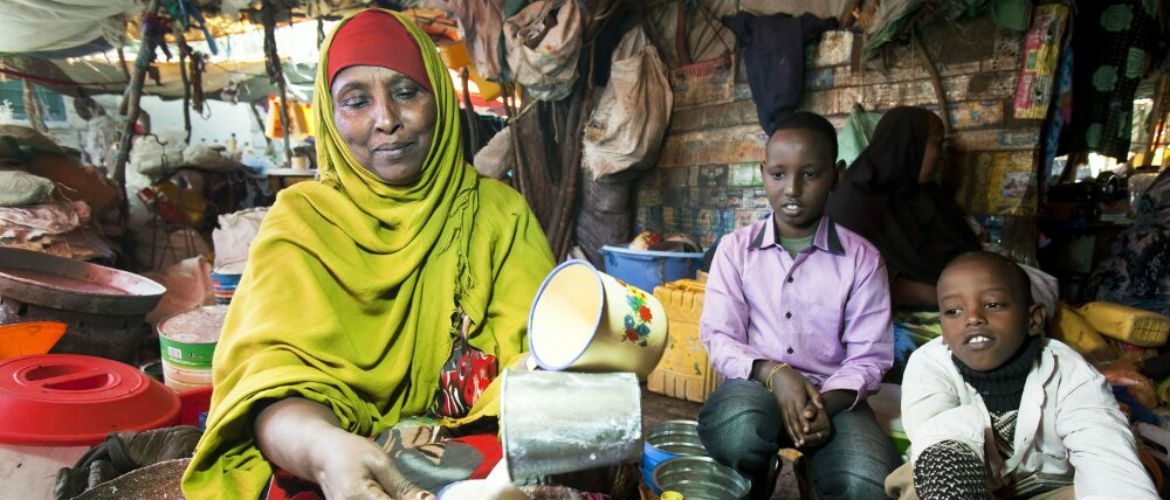
Hundreds of thousands of Somalis depend on financial support from family working abroad.
A new assessment shows for the first time that problems with the money transfer system are contributing to a significant reduction in vital remittance flows to vulnerable families in Somalia. Governments need to take action now to help families meet their everyday needs.
Why are remittances so important?
In recent years, Somali money transfer operators (MTOs), which represent the only legitimate mechanism through which the Somali diaspora can send money to their loved ones in Somalia, have struggled to maintain bank accounts. Remittances play a vital role in supporting vulnerable Somali families, with 41% of urban-dwelling Somalis receiving remittances. They spend the vast majority of the cash to meet basic needs like food, shelter, health care and education.
In Australia, around 7,500 Somali-Australians send approximately $33.5m to Somalia each year — more than double the AU $15 million in Australian humanitarian assistance to Somalia in 2014. However, their ability to send money to family members in Somalia has become increasingly difficult, with Australian banks gradually closing remittance companies’ bank accounts over several years due to risk concerns. In March this year, Westpac, the last major Australian bank providing these services to MTOs, closed their accounts.
It seems that some MTOs have been able to continue operating in Australia, but the situation is extremely fragile — with few guarantees of how much longer they’ll be able to continue. Some MTOs have stopped offering these services in the last two months, and others are considering doing so before the end of this year.
While these challenges facing MTOs in Australia are apparent, it’s been more difficult to know what the real impacts of the closures have been on remittance dependent families in Somalia. Today, we can say for certain that money is not getting through — at least not like it was before.
35% decline in remittances reported
For the first time, we have a real-time snapshot of how remittances to Somalia are helping Somali families provide for their most basic needs. The Food Security, Nutrition, and Analysis Unit (an arm of the Food and Agriculture Organization), earlier this week released a remittance assessment based on a survey of nearly 2,300 households in urban areas and among displaced populations across Somalia.
The assessment’s conclusions are distressing. In cities other than the capital Mogadishu, a large proportion of remittance recipients surveyed — approximately 35% — reported a decline in remittances. If these findings accurately reflect the situation throughout the country, hundreds of thousands, and perhaps millions of Somalis could be failing to obtain the support they depend on from abroad.
It’s difficult to say precisely how much of the decline has been caused by disruptions in the money transfer system, but it’s a lot — over a third said that money transfers were no longer available in the countries where their relatives were living. An additional 52% of those who experienced a decline in remittances chose the response “family members/friends/relatives reduced the amount they sent.”
Since the second response is so broad, some of these respondents may have received less because their loved ones abroad simply earned less or wanted to save more for themselves, but it may also be because of the inconveniences, limitations, and fees related to MTOs’ banking problems.
The bottom line is that at least a third, and possibly much more, of the reduction in remittances relates to problems with the money transfer system.
The Australian Government has made remittances a priority, establishing a multi-stakeholder Remittance Working Group in December 2014 bringing together banks, affected MTOs and communities, and relevant government departments to work towards safe and sustainable remittance solutions. Australia has also raised this issue within key international bodies like the G20 and the Financial Action Task Force (FATF).
While these efforts are welcome and will hopefully produce outcomes in the medium-long term, to date they have done little to address the fact that Somalia’s money transfer system is failing now, and a further, larger-scale disruption is possible at any time.
The next important steps
Faced with these realities, there’s an urgent need for a creative, solutions-focused collaboration between government, banks and MTOs to ensure vital remittance flows aren’t further disrupted in the short-term. Most importantly, it means bringing banks — whose services are needed by MTOs to send money abroad — back into the fold.
In part, it also means reducing the banks’ perceived risk concerns and building their confidence in providing services to MTOs. The remittance sector itself has already put forward some good proposals to strengthen their own self-regulation, but the government could also strengthen regulatory protection for banks who can demonstrate appropriate due diligence in dealing with MTOs.
Increasing incentives for banks to maintain accounts or to re-enter the remittance sector is also important.This could include establishing a more enabling regulatory environment for banks to provide services for small-medium MTOs, in support of a strong Australian commitment to inclusive financial growth worldwide.
It’s also critical to that the Australian Government works closely with other key governments, particularly the United States, to find ways to minimise the adverse impact of other countries’ financial regulations on legal remittance flows from Australia, and on Australian banks’ relationships with correspondent banks overseas.
The findings of the FSNAU’s remittance assessment clearly show that the time for action is now; thousands of Somali families which depend on remittances for their survival can’t afford to wait.